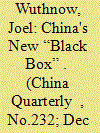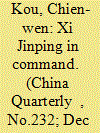| Srl | Item |
| 1 |
ID:
156603


|
|
|
|
|
| Summary/Abstract |
China's establishment of a Central National Security Commission (CNSC) in late 2013 was a potentially transformative event in the evolution of China's national security decision-making structure. Yet, as of mid-2017, few details about this organization and its activities have been released, leading to continuing questions about its likely role and functions in the Chinese system. Based on an analysis of numerous authoritative but under-utilized Chinese sources, this article addresses the rationale, prospects and implications of the CNSC. It argues that the organization is both a fulfilment of a long-held desire by many in China for a centralized, permanent national security deliberation forum and also a reflection of the unique challenges facing China in the 21st century. Contrary to existing analyses, which argue that the CNSC is likely to be focused primarily on domestic security tasks, the article contends that it is more likely to play a major role in both internal and external security affairs. Moreover, the article argues that if certain obstacles can be addressed, the CNSC may have broad implications in areas ranging from China's crisis response capability to the role played by the Chinese Communist Party general secretary in the national security decision-making process. The conclusion recaps the findings and suggests avenues for further research.
|
|
|
|
|
|
|
|
|
|
|
|
|
|
|
|
| 2 |
ID:
156602


|
|
|
|
|
| Summary/Abstract |
The PLA has been a key player in Chinese elite politics since 1949. However, a series of developments over the last four years has prompted China watchers to re-evaluate Party–military relations. This paper argues that CCP–PLA relations in the Xi Jinping era are characterized by the centralization of power in a single civilian individual. This centralization is reflected by events such as a new emphasis on the CMC chairman responsibility system, the establishment of new coordination bodies under the top leader, radical reforms to the military command structure, the promotion of Xi's public image as the top leader, and large-scale personnel reshuffes during which Xi's trustees have gradually come to occupy key military posts while his rivals have been removed. For Xi, these measures are an antidote to the principal–agent problem in CCP–PLA relations caused by both information asymmetry and the discrepant interests of civilian leaders and the top brass of the PLA.
|
|
|
|
|
|
|
|
|
|
|
|
|
|
|
|